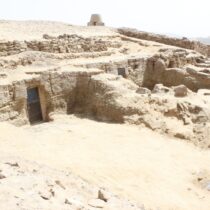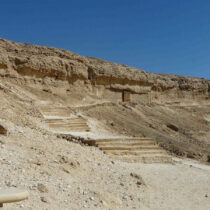A workshop where jars were produced 1,600 years ago (Roman period) in which there is a unique kiln used to fire the vessels was revealed in archaeological excavations of the Israel Antiquities Authority in Shlomi. The excavations are being carried out prior to the construction of a new neighborhood at the initiative of the Israel Lands Administration and the Shlomi Local council.
The kiln was discovered during the course of a large archeological expedition that has been going on for the past six months in which hundreds of young people from the north have volunteered, particularly students of the Shchakim High School of Nahariyya and Ort High School of Qiryat Bialik.
According to Joppe Gosker, excavation director on behalf of the Israel Antiquities Authority, “What makes the pottery works so special is its unique kiln, which was hewn in bedrock and is unlike most of the kilns known to us that were built of stone, earth and mud. The ancient workshop included a system for storing water, storage compartments, a kiln, etc.”. Gosker added, “The kiln was meticulously constructed. It consisted of two chambers – one a firebox in which branches were inserted for burning, and a second chamber where the pottery vessels were placed that were fired in the scorching heat that was generated. The ceramic debris that was piled up around the kiln indicates that two types of vessels were manufactured here: storage jars that could be transported overland, and jars with large handles (amphorae) that were used to store wine or oil which were exported from Israel by sea”.
According to Anastasia Shapiro, a geologist with the Israel Antiquities Authority who is researching the production of pottery vessels, “We can explain the quarrying of this rare kiln right here because of the special geological conditions found in the area of Shlomi: here there is chalk bedrock, which on the one hand is soft and therefore easily quarried, and on the other is sufficiently strong to endure the intense heat”.
A large part of the Bat el-Jabal antiquities site, where the pottery workshop was exposed in Shlomi, is slated to be an archaeological park that will be open for the benefit of the residents of the new neighborhood and the public in general. Archaeological surveys performed there have documented remains of a royal structure with a gate – probably from the Late Roman period, which coincides with the use of the pottery workshop. In addition, remains of the walls of buildings were identified that probably date to the Byzantine period, and as in the case of the unique kiln their builders took advantage of the natural stone in order to hew high foundations in the bedrock.
News: Israel
Impressive 1,600-year-old pottery kiln exposed in the Western Galilee
Hewn in bedrock
28 Jul 2016
by Archaeology Newsroom
- A
- A
- A
Listen up
1.
Israel Ministry of Foreign Affairs





